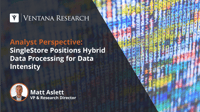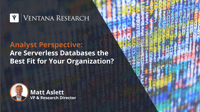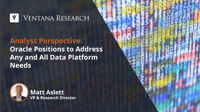I recently described the use cases driving interest in hybrid data processing capabilities that enable analysis of data in an operational data platform without impacting operational application performance or requiring data to be extracted to an external analytic data platform. Hybrid data processing functionality is becoming increasingly attractive to aid the development of intelligent applications infused with personalization and artificial intelligence-driven recommendations. These...
Read More
Topics:
Analytics,
Business Intelligence,
Cloud Computing,
Data,
Digital Technology,
AI & Machine Learning,
Data Platforms,
Analytics & Data
The server is a key component of enterprise computing, providing the functional compute resources required to support software applications. Historically, the server was so fundamentally important that it – along with the processor, or processor core – was also a definitional unit by which software was measured, priced and sold. That changed with the advent of cloud-based service delivery and consumption models.
Read More
Topics:
Data,
Digital Technology,
Digital Business,
Data Platforms,
Analytics & Data
Over a decade ago, I coined the term NewSQL to describe the new breed of horizontally scalable, relational database products. The term was adopted by a variety of vendors that sought to combine the transactional consistency of the relational database model with elastic, cloud-native scalability. Many of the early NewSQL vendors struggled to gain traction, however, and were either acquired or ceased operations before they could make an impact in the crowded operational data platforms market....
Read More
Topics:
Business Continuity,
Cloud Computing,
Data,
Digital Technology,
Digital Business,
Data Platforms,
Analytics & Data













